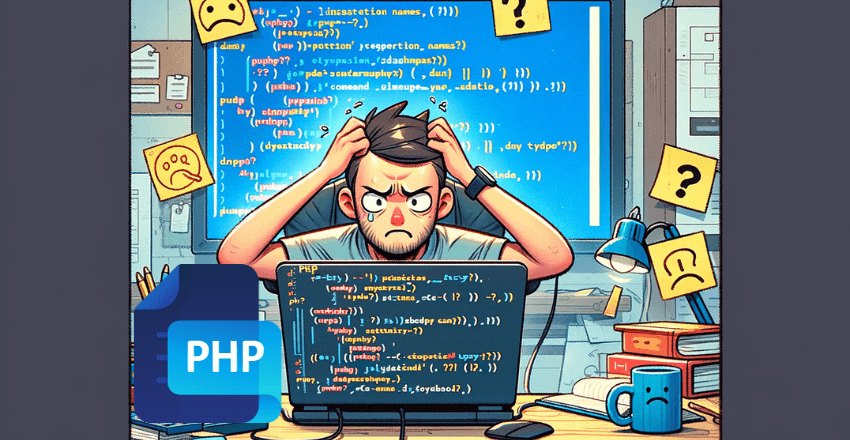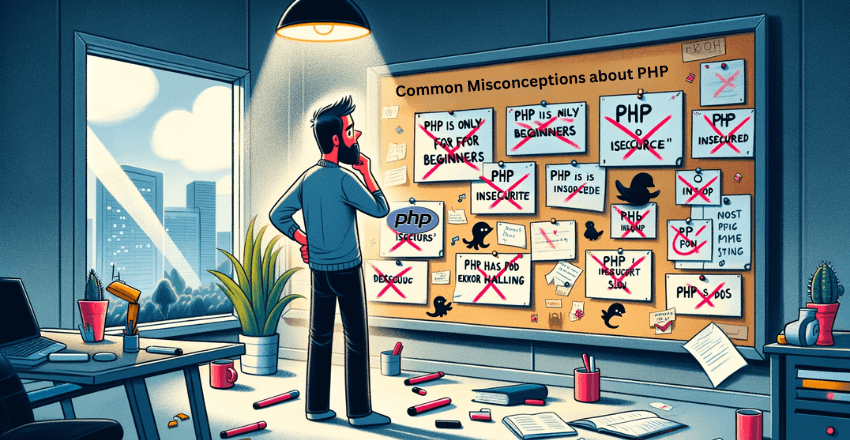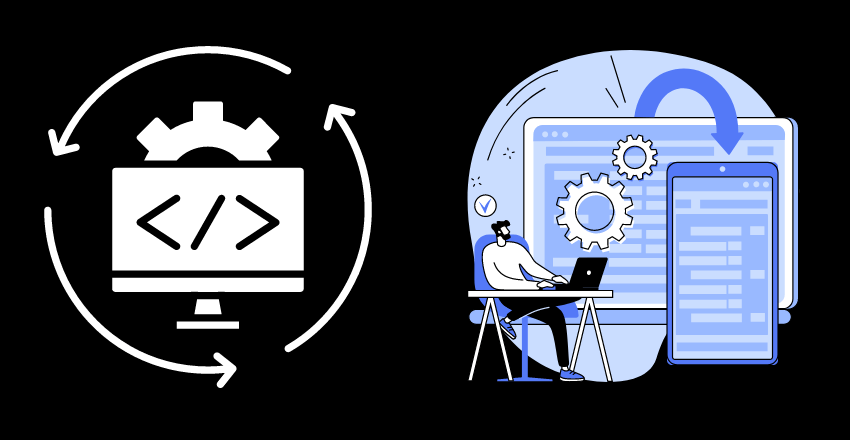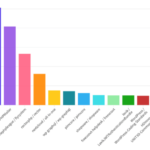 PHP, a popular programming language, has been criticized for its poor reputation among developers. Many have misconceptions about its functionality, leading to negative public perception and criticism. However, it’s essential to understand the reasons behind PHP’s bad reputation to address and reassess its reputation in a new light.
PHP, a popular programming language, has been criticized for its poor reputation among developers. Many have misconceptions about its functionality, leading to negative public perception and criticism. However, it’s essential to understand the reasons behind PHP’s bad reputation to address and reassess its reputation in a new light.
So, why does PHP have a bad reputation? One of the primary reasons is the prevalence of outdated PHP code that was written years ago. These old PHP codes are poorly structured and lack proper documentation. This has led to the belief that PHP is outdated and not capable of producing reliable and secure applications.
Additionally, PHP’s simple syntax has led to criticism that it’s not a serious programming language. This, coupled with security concerns, has further damaged PHP’s reputation.
However, it’s important to recognize that these misconceptions are not entirely accurate. In the following sections, we will delve into PHP’s history, its versatility, frameworks, and modern practices, community support, and ongoing development efforts.
By doing so, we aim to challenge these perceptions and encourage developers and organizations to reassess PHP’s potential as a reliable and powerful programming language.
History and Evolution of PHP
PHP has come a long way since its inception in 1994. Originally created by Rasmus Lerdorf as a set of Common Gateway Interface (CGI) scripts to track visitors to his website, PHP has evolved into a robust programming language used by millions of developers worldwide.
Over the years, PHP has undergone significant changes and updates to improve its functionality and usability. The release of PHP 3 in 1998 introduced the parser and core language that we know today. PHP 4, released in 2000, further improved performance and introduced support for object-oriented programming (OOP).
PHP 5, released in 2004, was a significant milestone for the language. It added new features like improved OOP support, exception handling, and the SimpleXML extension for parsing XML data.
The latest major version, PHP 7, released in 2015, offered significant improvements in performance, security, and consistency. It introduced features like return type declarations, anonymous classes, and improved error handling.
PHP’s Development History
PHP’s development has been a collaborative effort, with contributions from a vast community of developers worldwide. The language is open-source, and its source code is available for anyone to modify and improve.
The PHP development team is responsible for maintaining the language, fixing bugs, and adding new features. The team consists of a group of core developers who oversee the language’s development and a larger group of contributors who contribute to its ongoing improvement.
Common Misconceptions about PHP

PHP has garnered a reputation for being a less secure and less capable language than other options like Python and Java. However, many of these criticisms are based on outdated information, and PHP has evolved to address these concerns.
Let’s look at some of the most common misconceptions about PHP:
Myth: PHP is Inherently Insecure
This is one of the most persistent myths about PHP. While early versions of PHP suffered from significant security vulnerabilities, modern PHP has built-in security features and best practices that mitigate potential risks. Additionally, the PHP community is dedicated to addressing security concerns and continuously improving the language’s security protocols.
Myth: PHP is Slow
This misconception is based on outdated information about early versions of PHP. With the introduction of PHP 7 and subsequent updates, PHP has undergone significant performance enhancements, leading to faster and more efficient applications. Additionally, PHP’s popularity has inspired the creation of numerous tools and frameworks that further optimize its performance.
Myth: PHP is Outdated
While PHP may have started as a simple language for creating dynamic web pages, it has evolved into a versatile and powerful language for building complex web applications. Modern PHP development practices, such as the use of frameworks and best practices, have revolutionized the language and positioned it as a viable option for a wide range of development projects.
Myth: PHP is Difficult to Learn and Use
PHP has a relatively simple syntax and a vast community of developers and resources available to help individuals learn and use the language effectively. Additionally, the widespread adoption of PHP and the availability of numerous tools and frameworks make the language more accessible than ever before.
By dispelling these myths, we hope to shed light on the capabilities and potential of PHP. While it may have had a negative reputation in the past, modern PHP development practices and continuous improvements have established it as a reliable and powerful programming language.
PHP’s Versatility and Wide Adoption
PHP’s versatility has made it a popular programming language for web development. It can be used for creating anything from small personal websites to enterprise-level systems. This adaptability has contributed to its popularity and widespread adoption in the industry.
Many popular websites, including Facebook, Wikipedia, and WordPress, rely on PHP for their backend development. With its user-friendly syntax and ease of use, PHP has become a go-to choice for developers worldwide.
PHP’s community support further reinforces its popularity. A vast network of developers has contributed to PHP’s development, creating a wealth of resources and tools that make it easier for developers to use. There are also numerous PHP frameworks available that developers can use to streamline their coding processes and improve the quality of their applications.
The steady growth in PHP’s adoption and continued development demonstrate its relevance in the industry. As more and more developers discover its versatility, they are embracing it as a reliable and powerful programming language.
PHP Frameworks and Modern Practices
PHP frameworks have revolutionized the way developers write PHP code. They provide essential features, such as routing, templating, and database abstraction, simplifying and speeding up development. Frameworks like Laravel, Symfony, and CodeIgniter have gained a reputation for their robustness and scalability, enabling developers to build complex applications with ease.
One of the most impressive aspects of modern PHP development is the use of Composer. Composer is a package manager for PHP libraries and frameworks that has completely transformed PHP development. With Composer, developers can easily install and manage dependencies, making it a breeze to include third-party libraries and tools in their projects.
Another significant advancement in PHP development is the use of modern frontend tools such as NPM, Webpack, and Gulp. These tools streamline the development process and allow developers to write more efficient and maintainable code. By integrating these tools with PHP frameworks, developers can create powerful web applications that are optimized for performance and scalability.
Overall, PHP frameworks and modern development practices have elevated the capabilities of PHP significantly. By embracing these tools and practices, developers can write clean, maintainable code and build robust, scalable applications.
Continuous Improvement and Community Support

PHP’s maintainers and community invest significant effort in continuously improving the language, making it more efficient, secure, and user-friendly. Over the years, PHP has undergone substantial enhancements, providing developers with new features and capabilities, and addressing the concerns raised by the community.
The introduction of PHP 7 was a significant milestone in the language’s development, improving performance, reducing memory consumption, and enhancing the security features of PHP. Since then, the community has been working on regular updates and improvements, ensuring PHP remains competitive and relevant in today’s fast-paced technology landscape.
One major advantage of PHP is the extensive support and resources available within the PHP community. Developers can turn to online forums, user groups, and open-source libraries to share knowledge, exchange ideas, and collaborate on projects. The PHP community is committed to helping each other grow and learn, making PHP development a highly inclusive and supportive community.
Moreover, PHP’s open-source nature enables developers worldwide to contribute to the language’s improvement actively. They can take part in PHP’s development by submitting bug reports, feature requests, and patches to keep PHP up to date and relevant. PHP’s inclusive, collaborative community has been and will continue to be a key factor in driving PHP’s continuous improvement.
PHP’s continuous improvement and community support are crucial contributors to the language’s success. The maintainers and community invest significant effort into ensuring PHP evolves dynamically, providing developers with cutting-edge functionality and addressing security concerns effectively. The PHP community’s collaborative spirit and an abundance of available resources make PHP a practical and powerful language for building web applications of any scale and complexity.
Mitigating Security Concerns in PHP

While security concerns have been prevalent in the past, PHP has taken significant steps to address them in recent years. PHP now includes built-in security measures that developers can use to enhance the security of their applications.
One essential security feature is the ability to configure PHP security settings using the php.ini file. Developers can set parameters such as the maximum upload size, memory limit, and execution time, thereby limiting the potential for attacks that exploit these settings.
Additionally, there are several best practices that developers should follow to enhance application security. One of these is using parameterized queries to prevent SQL injection attacks. Parameterized queries help to protect against malicious attacks by ensuring that user input cannot be executed as code.
Another best practice is to use encryption to secure sensitive data, such as passwords and financial information. PHP provides several encryption functions, including password_hash() and password_verify(), which developers can use to increase the security of their applications.
Finally, it is essential to stay up-to-date with the latest security updates and patches for PHP. Developers should regularly check for and apply updates to ensure that their applications are not vulnerable to known security risks.
PHP Security Best Practices:
- Configure security settings in the php.ini file.
- Use parameterized queries to prevent SQL injection attacks.
- Encrypt sensitive data using available PHP encryption functions.
- Stay up-to-date with the latest security updates and patches for PHP.
Embracing PHP’s Strengths and Challenging Perceptions
PHP’s diverse range of applications, from personal websites to enterprise systems, and its extensive community support are evidence of its practicality and efficacy. The introduction of PHP 7 and subsequent updates have significantly enhanced the language, and PHP frameworks have revolutionized development practices and improved the quality of PHP applications.
Reevaluating PHP’s Reputation
It is time to dispel the myths and misconceptions surrounding PHP and reassess its reputation in a new light. PHP’s strengths far outweigh its weaknesses, and security concerns can be mitigated with best practices. By embracing PHP’s strengths and challenging negative perceptions, developers and organizations can harness its potential to build scalable, efficient, and robust solutions.
External Resources
https://www.php.net/manual/en/history.php.php
FAQ

1. Why is PHP criticized for having inconsistent function names and parameters?
Answer: PHP has evolved over many years with contributions from various authors, leading to inconsistent naming conventions and parameter orders in its standard library functions.
Code Sample – Inconsistent Naming:
// String functions
$lowercase = strtolower("Hello World");
$uppercase = strtoupper("Hello World");
// Array functions
$keyExists = array_key_exists("key", $array);
$length = count($array);Notice the inconsistency in naming conventions (strtolower vs array_key_exists).
2. Does PHP’s dynamic typing contribute to its bad reputation?
Answer: PHP’s dynamic typing can lead to unpredictable behavior and bugs, especially for developers accustomed to strictly typed languages.
Code Sample – Dynamic Typing Issue:
$number = "15" + 5; // PHP will convert the string to an integer
echo $number; // Outputs 20, which might be confusing for some3. Is PHP’s performance a reason for its bad reputation?
Answer: Earlier versions of PHP were criticized for performance issues, but significant improvements have been made in recent versions, particularly PHP 7 and above.
4. How does PHP’s approach to error handling contribute to its negative image?
Answer: PHP’s error handling, especially in older versions, was seen as less sophisticated compared to other languages, often leading to unclear or suppressed error messages.
Code Sample – Old Error Handling Approach:
@mysql_connect('localhost', 'username', 'password'); // The '@'
suppresses error messages5. Why is PHP often associated with security vulnerabilities?
Answer: PHP historically had several security issues, particularly in older versions and when used by inexperienced developers who might not follow best security practices.
Code Sample – SQL Injection Vulnerability:
$unsafeVariable = $_GET['user_input'];
mysql_query("SELECT * FROM table WHERE column = '$unsafeVariable'");
// This query is vulnerable to SQL injectionWhile PHP has been criticized for these and other reasons, it’s important to note that many of the issues have been addressed in more recent versions of the language. PHP continues to evolve, with a focus on improving its performance, security, and consistency.
The language remains widely used and has a large, active community, making it a viable option for many web development projects.
Michael is an accomplished technical author renowned for his expertise in scientific computer science. With a distinguished career as a development manager at Yahoo, Walmart, and FedEx, he has demonstrated exceptional leadership and technical acumen in delivering successful projects.
With an unwavering interest in PHP development, Michael has been at the forefront of this powerful programming language for the past 22 years. His passion for PHP has driven him to explore its vast potential and harness its capabilities to create innovative and scalable web solutions. Michael’s expertise in PHP development encompasses various frameworks, libraries, and best practices, making him a trusted authority in the field.



![How to use Cursor AI to write PHP Code[Example]](https://hirephpdeveloper.dev/wp-content/uploads/2025/03/How-to-use-Cursor-AI-to-write-PHP-Code-1-150x150.png)



